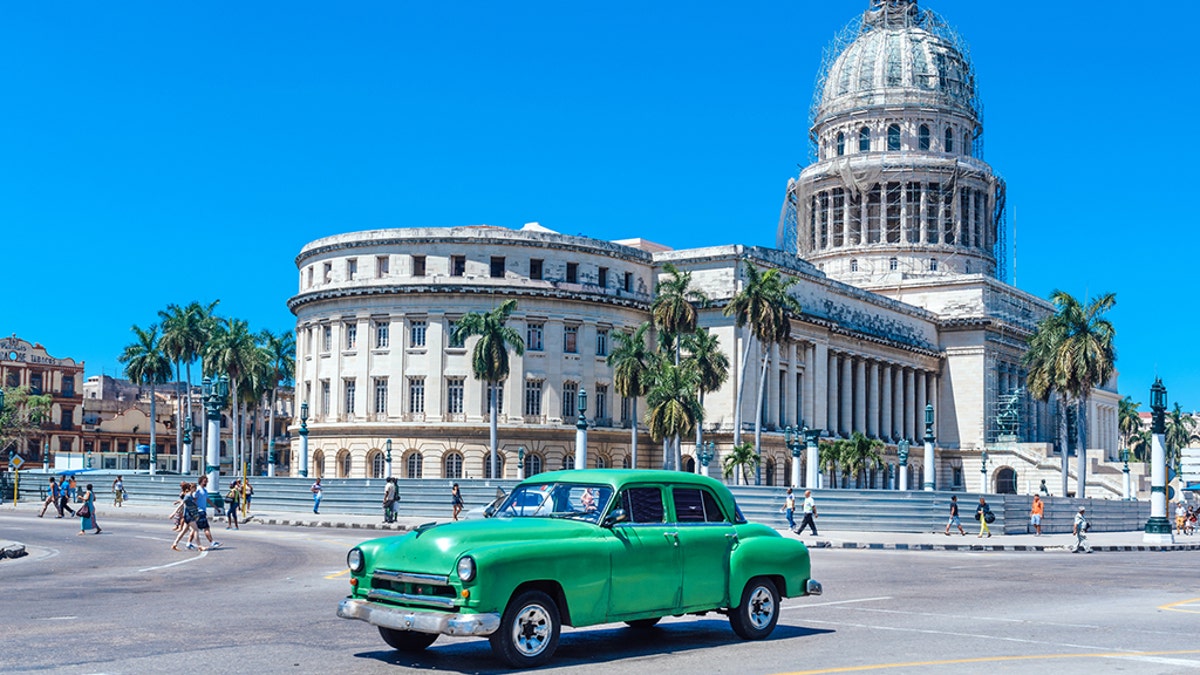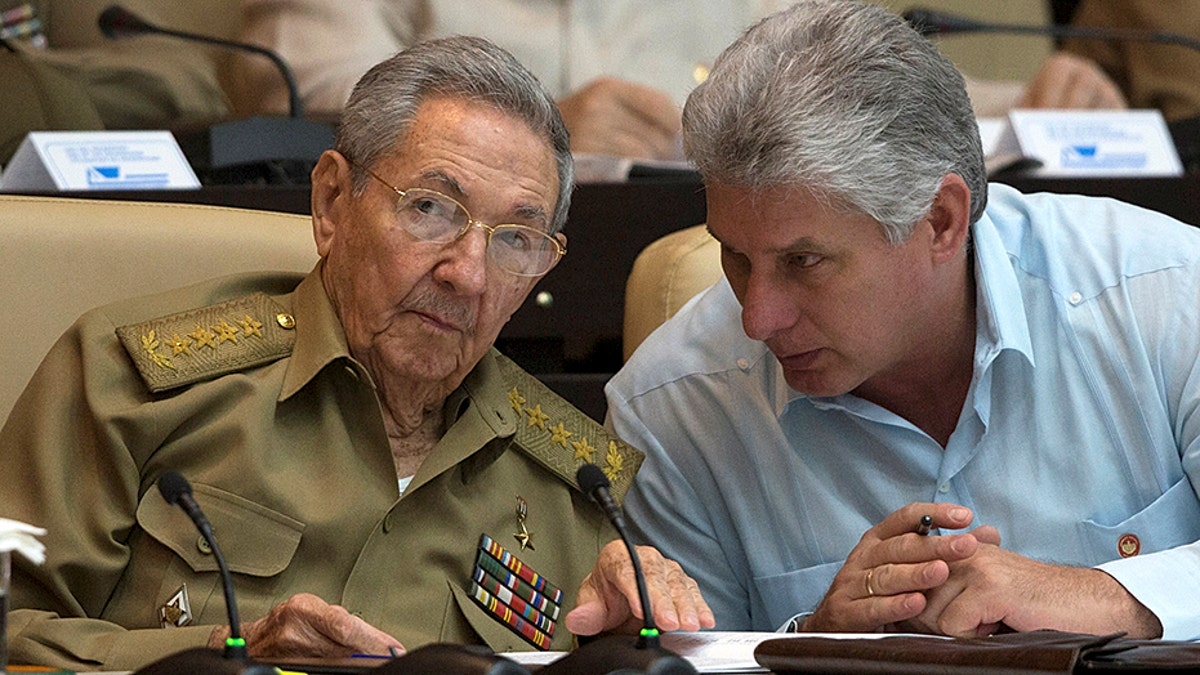
Cuba's Capitol, or El Capitolio, in Havana. (iStock)
In a reversal of a years-long decline in support for the U.S.-Cuba trade embargo among South Florida Cuban-Americans, a new poll shows more now agree with the restrictive policy that was eased by the Obama administration, but remains in place.
The poll, conducted by Florida International University, was evenly split between the 45 percent who said the U.S. should keep the embargo, the 44 who want it to end, and the 11 percent who said they were unsure.
That's almost a 10-point change from the poll that roughly two years ago found 54 percent wanted the U.S. to end the embargo - and showed more optimism about the prospect of improved U.S.-Cuba relations.
An overwhelming 80 percent of the 1,001 Cuban-American respondents viewed the embargo as a failure, which has not wrung enough democratic reforms from the Cuban government. But the change in the amount who support the embargo seemed to reflect a frustration with the lack of progress in Cuba since the sanctions were eased in recent years.
President Barack Obama announced a restoration of diplomatic relations with Cuba in 2014, and loosened travel and trade restrictions. In 2016, Obama became the first sitting U.S. president to visit Cuba since Calvin Coolidge, in 1928.
Younger Cuban-Americans, including those from the second and third generations, expressed the most opposition to the embargo. Cuban Americans who came to the U.S. after 1995 also viewed the embargo more negatively than others.
But it was among older Cuban-Americans that support for the embargo jumped more than 10 points – from 57 to 68 percent - in the latest poll. And more than half of Cuban-Americans who are registered voters agree with maintaining the embargo.
At the same time, 63 percent said they supported Obama’s decision to open diplomatic relations with Cuba.
“The mood of the community has changed in the last two years,’’ said Guillermo Grenier, the principal investigator on the project, and chairman of the Department of Global and Sociocultural Studies in the Steven J. Green School of International and Public Affairs, the primary sponsor of the poll. “We see a community divided on the issue of the embargo, while still willing to maintain and even expand business relationships established as a result of the Obama initiatives.”
“Cuban-Americans continue to welcome and support many of the changes in U.S. policy since December 2014, such as travel, the maintenance or expansion of limited economic relations and the willingness to allow U.S. citizens to invest in Cuban businesses,” the poll authors wrote. “Yet, there is a retrenchment of old, less conciliatory positions by the old, less conciliatory segments of the community.”
The embargo long has been described as symbolic by both its supporters and critics, who view it as a solitary move in a world that keeps diplomatic and economic ties with Cuba.
The new poll results explain why many Cuban Americans support the embargo, even as they concede it has not pushed real change in Cuba.

Cuba's President Raul Castro (L) chats with Cuba's Vice President Miguel Diaz-Canel react during the National Assembly in Havana, Cuba, July 8, 2016. Ismael Francisco/Courtesy of Cubadebate/Handout via Reuters.
Dulce Canal, spokeswoman for the Madrid-based Cuban Observers of Human Rights, told Fox News: “The survey results reflect the rejection of the Cuban regime and its policies and practices. There is a collective weariness that has festered over time after so much frustration and oppression. The reaction among these Cuban Americans is a natural one toward the Cuban regime’s intolerance and inflexibility.”
Cuba each year urges the U.N. General Assembly to pass a resolution critical of the embargo, a text that normally obtains majority backing. According to Cuba, the U.S. embargo has cost the island more than $800 billion since it was was implemented in 1962.
Succeeding U.S. presidential administrations and many members of Congress have said the embargo will not be lifted until Cuba moves toward more democratic reforms, like legitimate elections and freedom of expression. During his presidential campaign, and as president, Donald Trump said Obama’s decision to ease trade and travel restrictions essentially played into the hands of a regime that had made virtually no concessions in return.
Cuban government officials typically deny the existence of political prisoners, saying instead that counter-revolutionary activities, or trying to incite others against the regime, is a crime.
Obama earned praise by moving forward with normalizing relations, particularly among those who said it was time to turn the page in U.S.-Cuba relations. But others said Obama gave away too much, and got back little or nothing in return. And not only did Obama's actions not benefit the U.S., the critics said, they did nothing to help the Cuban people.
The survey results reflect the rejection of the Cuban regime and its policies and practices. There is a collective weariness that has festered over time after so much frustration and oppression
Cuba's new president, Miguel Diaz-Canel, who took over last year from Raul Castro, who in turn succeeded his brother Fidel 2008, was the hand-picked successor of Cuba's leadership. And while some significant changes did take place under Raul Castro, including more access to the Internet by critics of the government, and the chance for Cubans to run their own businesses.
Travel outside the island became less restrictive, and some of the government’s most vocal critics, including Guillermo Farinas and Yoani Sanchez, were allowed to travel abroad – where they firmly assailed the island’s political leaders in speeches and media interviews -- and return to Cuba. Many of those moves did not occur under Fidel Castro’s leadership.
But much has not changed. Political opposition is discouraged and often punished, with threats of job loss and imprisonment. Dissidents still report incidents of beatings and arrests for participating in peaceful marches or expressing opposition.
“If the polling is an accurate portrait, likely an ‘exasperation factor’ contributed to the increase in those supporting the ‘embargo,’” said John S. Kavulich, president of the U.S.-Cuba Trade and Economic Council, Inc., in New York. “From December, 2014 through November, 2016, there was an expectation, perhaps more of a rational hope, that the Obama administration changes to the bilateral commercial, economic and political relationship with the Republic of Cuba would continue through [a Hillary] Clinton administration. That was faulty thinking because of the outcome of the election.”
“There was also an expectation, and, again, rational hope, that changes taking place in the Republic of Cuba would continue but, more importantly, would increase in velocity,” Kavulich said to Fox News. “The transition from the Castro administration to the Diaz-Canel administration would bring a new dynamic.”
But the result has been "a continuing struggle by the government of the Republic of Cuba in determining the definition of success and the level of success permitted for a citizen," he said. "Finally, there has been a disappointment by individuals of Cuban descent who reside in Florida with the abject lack of Obama Administration initiatives permitted to be implemented by the government of the Republic of Cuba."
?





















